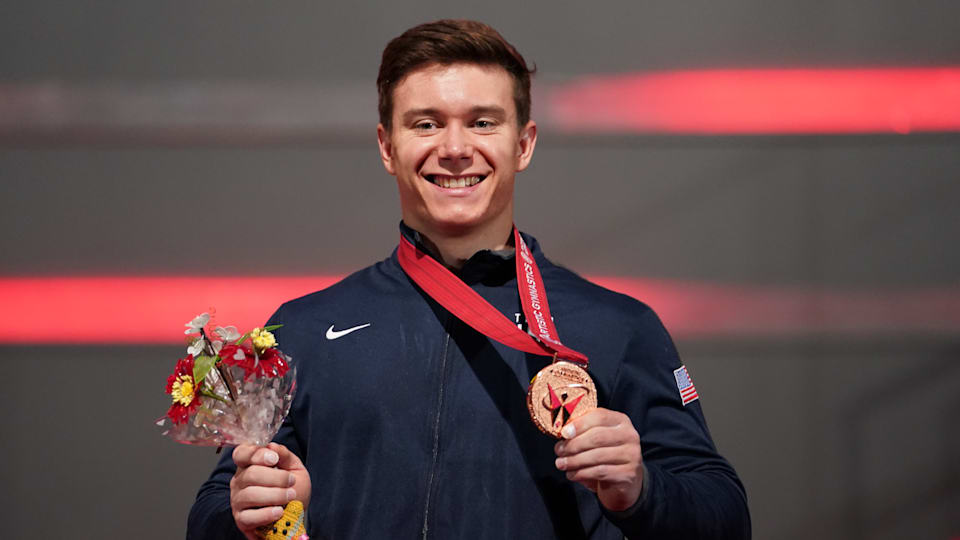
Brody Malone continued to show that he is Team USA's best male gymnast Sunday (31 July) as he grabbed the gold medal in the all-around at the U.S. Classic in Salt Lake City.
Malone, the 2021 U.S. champion and winner of a bronze medal on the horizontal bar at the 2021 worlds, scored a 88.558 total ahead of Colt Walker (85.264) and Donnell Whittenburg (85.018).
"I was pretty happy with it. I was putting in some upgrades on a lot of things and for the most part they went really well," said Malone afterward. "I was happy, super happy."
The event, which is the final qualifier to next month's U.S. championships in Tampa, was meant to be a testing ground for a U.S. squad that is focused on increasing their difficulty scores across the board to contend for a team medal internationally.
Part of that push for difficulty includes a bonus system for athletes who hit certain difficulty scores. Malone, for instance, earned 2.558 in bonus across the six events. Under standard international scoring his all-around total would have been 86.000.
Those bonuses, says Malone, are crucial to Team USA to end a streak of three-straight fifth-place Olympic team finishes at Paris 2024.
"I think that bonus system is great because it really motivates guys to put in the difficulty, and that's what we have to do if we are ever going to be competitive," he said. "So, I think it's a great idea and they're executing it really well and it's actually motivating guys to put in difficulty."
"This came from the athletes and the coaches. This was not my brain that created this madness," said U.S. men's high performance director Brett McClure, a 2004 Olympic silver medallist. "I have done a one-tenth, two-tenth, three-tenth bonus system before as an athlete, as a coach, and I have pitched it to everybody, let's just do one, two or three tenths, and every time, it's not enough - for one tenth - in the gym to do such a more difficult routine.
"They needed more incentive to stick to it and to have a point bonus instead of a tenth bonus was essentially that extra motivation, that extra incentive, for them as athletes and coaches to push it," continued McClure. "It made it worth it because they could essentially fall and still get the same score they would have if they hadn't without the difficulty."
Three new leaders
Malone, says McClure, is part of an emerging new generation of leaders in the U.S. squad following the retirement of three-time Olympian Sam Mikulak.
"Brody's done a great job," McClure said. "I think he's kind of the default leader."
Malone's Tokyo 2020 teammates Shane Wiskus and Yul Moldauer have also stepped up to the plate.
"Shane, he just wants everyone to be successful and he wants everyone to be on the podium. He's kind of... He wants to be the enforcer. But he also needs to enforce his own gymnastics," explained McClure. "Then, Yul, you know, Mr. Hypeman is still Mr. Hypeman and he wants he wants to give all those pieces of advice, his little nuggets of advice, to the younger generation. So, between those three guys, we'll see. It might just be a Cerberus, the three headed dog ... you know, three headed leadership role. Those guys have done a great job with it."
Malone agreed.
"For us three, we're trying to really take the lead and push the rest of the the other guys to start pushing difficulty," he said, "so we can get on the podium because we've got to push the difficulty [to do that]."
